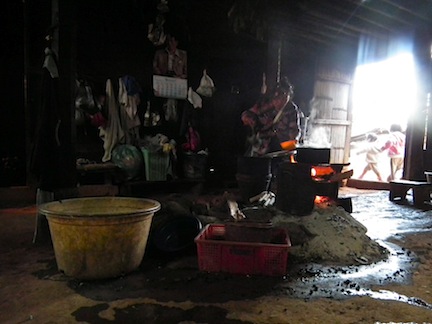Parshas Bo: Teaching is the Best Way to Learn
This week, Rabbi Ben and I went to the Hill Tribe Museum in Chiang Rai, Thailand. Usually, we skip museums because after a while they all start to blend together. You forget what you saw where, if you remember any of it at all. Museums are usually too much to take in all at once, especially when you’re seeing so many of them. But we made an exception and visited the Hill Tribe Museum anyway.

When we visited this Mong family for Mong New Year, I had no idea what to give as a gift of thanks. At the Hill Tribe Museum I learned that string or beads (for making traditional costumes) would have been the best gift. Now I share this information with all the other tourists I meet.
The Hill Tribe Museum in Chiang Mai doesn’t have many exhibits, but I found it a great visit anyway. In fact, I really enjoyed it because I feel like I learned a lot about the tribes and cultures of Thailand, which I might never have learned otherwise. One of the interesting things I read was this idea: A lot of people come to Thailand to do “voluntouring” – volunteering as a way of touring the country. But perhaps what the tribal people need is less Western people coming to teach them things and more Western people coming to learn things.
It was an interesting point. How arrogant we Westerners are to think we are doing these tribal people so much good! We come in with our English language, our jeans, and our foods and think we are helping them, when really we are just cogs in the great wheel of assimilation that quashes cultures. What we could do, instead, is to visit these tribes and learn from them – and then take that new wisdom, knowledge, and information back to our home countries and teach it to our compatriots.
Pesach (Passover) is just around the corner. Approximately two months to go and we’re already preparing for it through a massive review of the exodus chapter in our history. But in this week’s Torah portion, Hashem (G-d) tells us to do more than simply review the story of what happened to us in Egypt and our exodus from that terrible place. We are told to teach the story. The parsha says:
“And so that you may relate in the ears of your son and your son’s son that which I have played with (punished) Egypt, and My wonders that I placed among them. And then you will know that I am God.”
“And then you will know that I am God.” Rabbi Boruch Leff explains that this means we have to obtain knowledge - not just belief – and that the way to do this is to teach others. Why? Because, as the Talmud (Taanit 7a) says:
“Rabbi Chanina said: ‘I have learned much from my teachers, from my colleagues even more, but from my students I have learned the most.’”
And indeed, modern science backs this up. As Rabbi Leff points out,
William Glasser, Ph.D., once conducted a study in which he concluded that people learn 10% of what they read, 20% of what they hear, 30% of what they see, 50% of what they see and hear, 70% of what is discussed with others, 80% of what they experience, but 95% of what they teach to others.
Now, two months before Pesach, we review the story because, when Pesach arrives, it is our obligation to teach it to others – especially our children. And in teaching it to others, we learn it better ourselves.
So in running the Traveling Rabbi blog, we are not just hoping to share Torah and halacha with others, but also to increase our own learning. And so, when we learn interesting things, as we have this week at the Hill Tribe Museum, during our stay with the Akha Hill Tribe in Northern Thailand, and during our celebration of the Hmong (or Mong) New Year, we will endeavor to share them with you. In doing so, we will increase our own knowledge. Look out for those posts.
And of course, feel free to share anything you learn on the Traveling Rabbi blog with others because you will gain benefit also. If there is anything you want to see addressed or any questions you need answered, send us a message or a comment. We love to hear from you! Let’s all continue sharing, learning, and growing!
Shabbat Shalom!
Read more on Parshas Bo: Taking Responsibility for Our Mistakes
Read More




